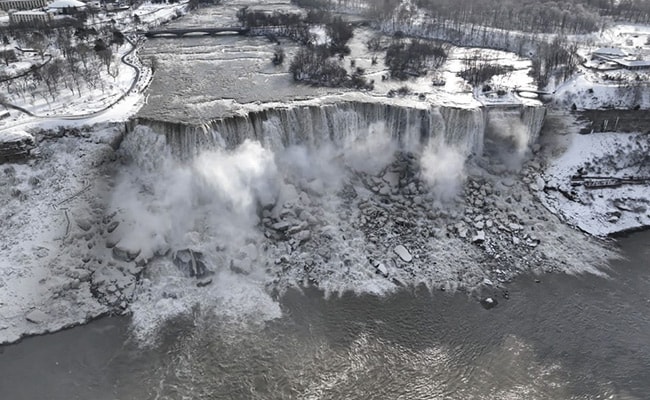
The intense weather that swept parts of the United States left a wide trail of destruction. More than 50 people have also been killed across the country as 'blizzard of the century' brought icy cold winds to the US. Niagara Falls, one of the highest waterfalls in the world, was also frozen by the winter storm. It is one of the most popular tourist spots thronged by tourists from across the world and spans the border between Ontario in Canada and New York in the United States.

According to its website, the Falls at Niagara are about 12,000 years old. (Getty Image)
Images of the waterfall show a magical scene - frozen mist and sheets of ice blanketing the water of Niagara Falls.

The Niagara River flows at approximately 56.3 kilometres/hour. (Getty Image)
The sheer volume of water that gushes over did not allow the entire Niagara Falls to be frozen. It is a group of three waterfalls at the southern edge of Niagara Gorge, the largest being the Horseshoe Falls.

It is the combination of height and water flow that makes Niagara Falls so beautiful. (Getty Image)
According to Niagara Falls New York State Park, 3,160 tonnes of water flows over the waterfall every second. The water falls at the speed of 32 feet per second.

The largest of the three Niagara Falls - the Horseshoe Falls - are 180 feet high. (AFP Image)
There are tweets from users that claim the US side of Niagara Falls has frozen five times in the past when ice blocked the flow of the water up the river.

Niagara Falls' night time illumination makes a visitation to Niagara a spectacular event. (AFP Image)
As per the official website, Niagara Falls were formed when melting glaciers formed massive fresh-water lakes, one of which ran downhill towards another. It carved a path in the form of a river and at one point passed over a steep cliff-like formation (Niagara Escarpment) en route to the Atlantic Ocean.
Track Latest News Live on NDTV.com and get news updates from India and around the world

